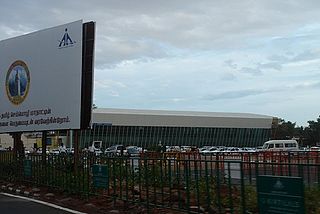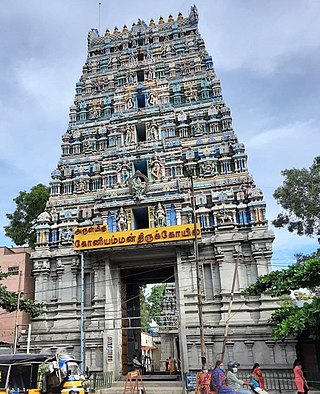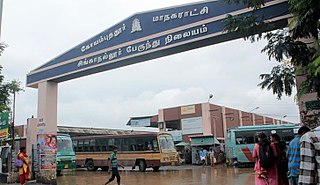
Coimbatore has many tourist attractions. [1]


.






Coimbatore has many tourist attractions. [1]


.





The following are Geographical Indication tags associated with Coimbatore city.

Coimbatore, also known as Kovai, is one of the major metropolitan cities in the Indian state of Tamil Nadu. It is located on the banks of the Noyyal River and surrounded by the Western Ghats. Coimbatore is the second largest city in Tamil Nadu after Chennai in terms of population and the 16th largest urban agglomeration in India as per the census 2011. It is the administrative capital of Coimbatore District and is administered by the Coimbatore Municipal Corporation which was established in 1981.

The Noyyal River is a small river in Western Tamil Nadu, and a tributary of Kaveri River. It rises from the Vellingiri hills in the Western Ghats in Tamil Nadu, very closer in proximity to Kerala border, and flows through many villages and the cities of Coimbatore, and Tirupur. Then finally, the river drains into the Kaveri River at Noyyal, a village in Karur district named after the river itself. The river's basin is 180 km (110 mi) long and 25 km (16 mi) wide and covers a total area of 3,500 km2 (1,400 sq mi). Cultivated land in the basin amounts to 1,800 km2 (690 sq mi) while the population density is 120 people per km2 (311/mi2) in the countryside, and 1000 people per km2 (2590/mi2) in the cities. The area is known for its scanty rainfall and the development of the Noyyal River Tanks System to hold any overflow from the rains plus the water of the Northeast and Southwest monsoon season was ecologically important. Kausika river, which originates along the northern side of Coimbatore district in the Western Ghats along with its consequent streams, lake and pond systems is an important tributary of the river. The 173 km (107 mi) long tributary of the Kaveri River filled 32 tanks. These interconnecting tanks held the water flowing from the Noyyal.

Coimbatore district is one of the 38 districts in the state of Tamil Nadu in India. Coimbatore is the administrative headquarters of the district. It is one of the most industrialized districts and a major textile, industrial, commercial, educational, information technology, healthcare and manufacturing hub of Tamil Nadu. The region is bounded by Tiruppur district in the east, Nilgiris district in the north, Erode district in the northeast, Palakkad district, Idukki district and small parts of Thrissur district and Ernakulam district of neighboring state of Kerala in the west and south respectively. As of 2011, Coimbatore district had a population of 3,458,045 with a sex ratio of 1,000 and literacy rate of 84%.
Karumathampatti is a Municipality in the Coimbatore district in the state of Tamil Nadu, India. It is one of the prominent developing suburb in Coimbatore metropolitan area, about 25 km away from the city centre. It is situated in between NH544 which connects the city of Coimbatore with Salem – Erode – Tirupur and also in between the State Highway 165 connects Annur – Kamanaikenpalayam. Nearby places are Somanur-3 km, Avinashi-10 km, Tirupur-20 km, Sulur-15 km, Annur-16 km. Coimbatore -27,Mettupalayam-38,Palladam-19. Karumathampatti lies near the junction of two major roads, NH544(Coimbatore – Salem) and Karumathampatti – Annur road.
Mettupalayam is a municipal town and headquarters of Mettupalayam Taluk in the Coimbatore District of the Indian state of Tamil Nadu. It is the second largest town in the Coimbatore district after Pollachi. It is located to the north of Coimbatore city on the way to Ooty, in the foothills of Nilgiri hills. As of 2011, the town had a population of 69,213. Mettupalayam railway station is the starting point of Nilgiri Mountain Railway and it operates the only rack railway in India connecting Ooty and Mettupalayam. It is a suburban area of Coimbatore City.

Perur is a major residential neighbourhood and cultural hub of the city of Coimbatore in Tamil Nadu, India. It is located on the banks of Noyyal River, which divides the settlement into equal halves.
Thenkarai is a suburban area near Coimbatore City Municipal Corporation, in the Indian state of Tamil Nadu. It is in the western suburbs of Coimbatore. It recently merged with the Coimbatore Corporation limits. Thenkarai is one of the town panchayats in Coimbatore and consists of small villages such as Sennanur, Mathipalayam, Karadimadai, Thaneer Panthal, Appachimaar Kovil, Challikkuzhi and KrishnaPuram Pudur.
Thondamuthur is a suburb of Coimbatore city in the Indian state of Tamil Nadu. It comes under the Coimbatore Corporation. Thondamuthur is located 15 km west from the District headquarters Coimbatore, there are three routes available to reach Thondamuthur, through Vadavalli (15 km), through Perur (15 km), through Gandhi park, Vedapatti (14 km). Thondamuthur is the residential area. There is very high rise in population due to the development of many residential plots, apartments and many people reside here because the place is well connected with city centre through many routes and they can easily commute daily from Thondamuthur. The climate of Thondamuthur is very pleasant, low pollution, and many tourist spots like kovai Kutralam, Velliangiri hills, Isha Foundation, Siruvani hills, Vaidehi falls are situated near Thondamuthur. People can taste World's second tastiest water Siruvani here.
Ukkadam is a part of Townhall locality in the core part of the city of Coimbatore, Tamilnadu, India. Ukkadam Bus Terminal, which is one of the seven major bus stands in the city, is located in this neighborhood. Ukkadam is famous for its Fish Market and Jackfruit Market.

The Velliangiri Mountains a part of the Nilgiri Biosphere Reserve are situated at the Western Ghats of Coimbatore district, Tamil Nadu. Known as the "Sapthagiri, 7 Hills - Seven Mountains", these mountains are held and revered on par with spiritually most powerful place on the planet - Mount Kailash, the legendary abode of Shiva. On the top of the Velliangiri Mountains, Shiva is worshipped as Swayambhu, one who is self-created and in this form, he graces the devotees.

Perur Pateeswarar Temple is a Hindu temple dedicated to Lord Shiva located at Perur, in western part of Coimbatore in state of Tamil Nadu in India. The temple was built by Karikala Chola in 2nd century CE. The temple is located on the bank of the Noyyal River and has been patronized by poets like Arunagirinathar and Kachiappa Munivar. Patteeswarar (Shiva) is the presiding deity of this temple together with his consort Pachainayaki (Parvati). The main deity is a Swayambu Lingam.

Coimbatore is a city in the state of Tamil Nadu, India. Most transportation in the city and suburbs is by road. Coimbatore is well-connected to most cities and towns in India by road, rail, and air, but not through waterways. The city has successful transport infrastructure compared to other Indian cities, though road infrastructures are not well maintained and developed according to the growing needs of transport, making traffic congestion a major problem in the city. A comprehensive transport development plan has been made to address many traffic problems.

Coimbatore is the second largest city in the Indian state of Tamil Nadu. It is situated in the western corner of Tamil Nadu, a short distance from the border with the neighbouring state of Kerala, and is surrounded by the Western Ghats on all sides.

The Coimbatore Bypass Road refers to a series of bypasses connecting the various National Highways and State Highways passing through and originating in the South Indian city of Coimbatore.

Ukkadam Lake is a lake in Ukkadam, Coimbatore, South India. It is spread over an area of 1.295 km2 (0.500 sq mi) and has an average depth of 5.82 m (19.1 ft). In 2010, the lake was taken over by Coimbatore Corporation on a 90-year lease from the Public Works Department of the Government of Tamil Nadu.
Culture of Coimbatore is based on the culture of the Kongu Nadu region and is distinctly unique. Being a cosmopolitan city, the culture of the city reflects its diverse population which has resulted in a unique blend. Though it is generally considered a traditional city, Coimbatore is more diverse and cosmopolitan than other cities in Tamil Nadu. Traditional music, dance and all other art forms of Tamil Nadu are very popular in the city. One can find a unique blend of culture from traditional foods to fast foods, from ancient temple architecture to modern high-rises and from classical music and dance to the growing nightlife in the city. Popularly called as the Manchester of South India, the city is known for its industries and has developed a reputation for entrepreneurship.

Arulmigu Koniamman Temple, is a historic Hindu temple located on the northern bank of the Noyyal River of Coimbatore, Tamil Nadu, India. It is dedicated to the goddess Koniamman, a form of Parvati. The temple is at the center of the city of Coimbatore in the core of the city, Town Hall, Coimbatore, Tamil Nadu, India. Koniamman is the "Guardian Deity" of the city. This temple is one of the twin historic temples in the city, the other being Perur Pateeswarar Temple.

Singanallur is a major residential locality of the city of Coimbatore in Tamil Nadu, India. It is located on the banks of Noyyal river, which runs to the southern boundary of the locality. It is situated in the eastern part of the city, and is a major hub for the inter-city bus services towards Southern and Central districts of Tamilnadu from the city. It is one of the well developed neighborhoods in the city and has been part of Coimbatore Corporation since 1981. The East Zone Office of Coimbatore City Municipal Corporation is located at Singanallur.
Nanjundapuram is a residential neighbourhood of the city of Coimbatore in Tamil Nadu, India. It is one of the well developed neighborhoods in the city and has been part of Coimbatore Corporation since 1981. The name "Nanjundapuram" is derived from the Nanjundeshwarar Temple located on the banks of Noyyal river.
Selvapuram is a major residential locality of the city of Coimbatore in Tamil Nadu, India. It is located on the banks of Noyyal river, which runs to the northwestern boundary of the locality. It is situated in the northwestern part of the city, and is a major residential and industrial locality in the city. It is one of the well developed neighborhoods in the city and has been part of Coimbatore Corporation since 1866.
{{cite news}}: |author= has generic name (help)